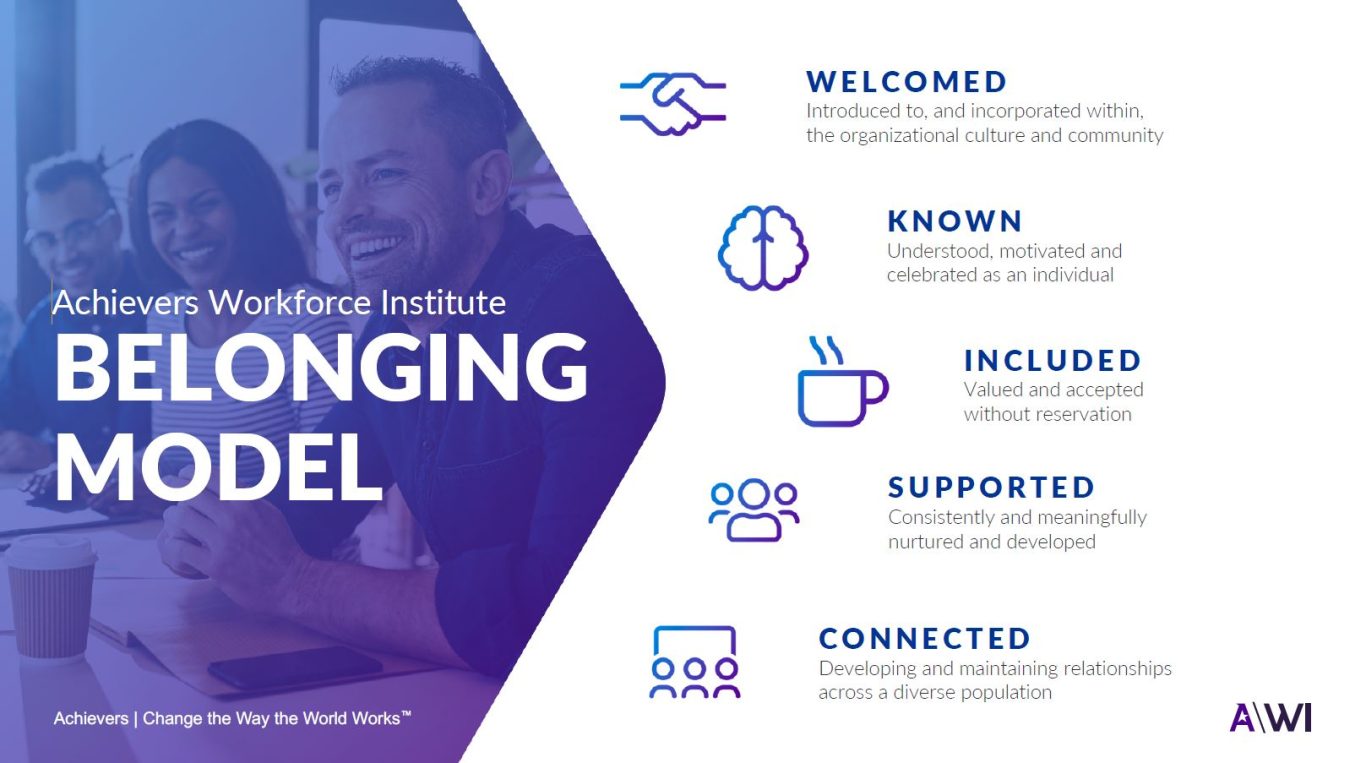It’s long been known that successful Diversity, Equity, and Inclusion programs drive business results. But organizations need to understand what the mechanism is behind those results.
New research from the Achievers Workforce Institute suggests the answer: a strong sense of belonging.
Employees with a strong sense of belonging are more productive, resilient, engaged, and committed. They’re more likely to recommend their employer as a great place to work and say they are able to look after their mental and physical wellbeing.

In this, now on-demand session, Dr. Natalie Baumgartner, Chief Workforce Scientist at Achievers, discusses the five pillars of belonging and how you can improve existing DE&I and employee experience programs to develop belonging inside your organization.
Belonging is an experience of connection, security, and community – it’s about feeling at home in one’s place, withour reservation.
Achievers Workforce Institute’s Definition of Belonging
Belonging ranked as the top topic on the Deloitte 2020 Global Human Capital Trends survey, with 79% of survey respondents saying that fostering a sense of belonging in the workforce was important to their organization’s success in the next 12-18 months, and 93% agreed that a sense of belonging drives organizational performance. As Deloitte commented at the time of the report’s release, “belonging – including the sense of feeling respected and treated fairly – has been an organizational priority for some time. Promoting respect and fairness for all is a large part of many organizations’ diversity and inclusion efforts, and those efforts, when effective, pay off.”
But what is belonging at work and how can HR leaders cultivate a culture of belonging that positively impacts your employees? That’s what Achievers have answered in its latest research report: the 2021 Culture Report on Belonging at Work.
The report outlines the findings from the Achievers Workforce Institute‘s own research, where it surveyed 3500 global respondents in June 2021. In this webinar session, Dr. Natalie Baumgartner, Chief Workforce Scientist at Achievers discussed the findings from the research, providing HR leaders with a clear roadmap for cultivating a culture of belonging within an organization, and demonstrated the compelling data for enabling leaders to present a strong business case for taking action around their employees’ sense of belonging.
In an era dominated by remote and hybrid work, employers must address belonging more than ever before.
The impact of belonging reaches across the organization, and with so many employees working distantly, ensuring that employees feel recognized and connected with your organization is crucial. An authentic culture of belongings will improve employee engagement and productivity, leading to reduced attrition and a more resilient workforce.
The Achievers research “confirmed that employees experience a deep and compelling sense of belonging when they feel: welcomed, known, included, supported, and connected – the pillars of the AWI Belonging Model.” Achievers established that all 5 of these pillars “positively and significantly correlate with a strong sense of belonging and higher engagement.”

Achievers Workforce Institute Belonging Model
In this webinar session, Natalie provides 4 key takeaways that will set HR leaders and organizations at large on the path to instilling a greater sense of belonging throughout their workforce. Through the Achievers Workforce Institute’s 5 pillars, leaders are provided with a clear framework for driving successful employee experience, and a toolkit to ensure these powerful topics get integrated into employees’ every day.
The Workforce Institute is the research and insights arm of Achievers. It provides thought leadership based on science, data, and research. Download its Culture Report on Belonging at Work today to delve deeper into how HR leaders can determine how to improve their current strategies, what benefits better belonging will bring their employees, and how technology fits into the equation, or watch our on-demand session with Natalie, today.
"*" indicates required fields
"*" indicates required fields
"*" indicates required fields